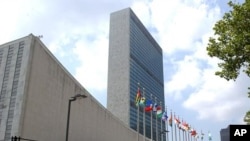United Nations economists have sharply cut their projections for world growth and warned that 2012 will be key to whether the global economy makes a slow recovery or falls back into recession.
In their report, World Economic Situation and Prospects 2012, U.N. economists forecast very low growth, warning that developed economies are on the brink of a downward spiral because of four factors: sovereign debt distress, fragile banking sectors, weak aggregate demand and policy paralysis.
The U.N.’s director of development and policy analysis, Rob Vos, warns the world could be facing a new economic downturn.
“We are at the brink of possible new recession," he said. "Though our baseline still assumes that the global economy may, as we call it in the report, 'muddle through' in the next two years, in the sense that maybe the sovereign debt crisis in Europe can be contained to some extent and also the problems in the U.S. economy will not worsen by much more. But that means that we are still in problems, in the sense that economic growth is very meager, it has slowed down already this year from the recovery we have seen in 2010.”
The International Monetary Fund has recommended fiscal austerity measures to ease the global economic crisis, but the U.N. Assistant Chief for Economic Development, Jomo Kwame Sundaram, cautioned against this approach.
“This turn toward fiscal austerity has exacerbated the downturn throughout the world," said Sundaram. "It is unlikely, of course, that a reversal will have an immediate effect all around, but there is a strong case to be made for further fiscal actions in the near term in order to create the conditions for stronger recovery.”
Sundaram said without collective action on recovery the situation could deteriorate further, especially in Europe where the debt crisis is spreading.
The U.N. recommends strengthening the European Financial Stabilization Fund, which helps troubled eurozone economies. The authors say if the fund could reduce borrowing costs that would lessen pressure on governments under financial stress.
The report notes that there is much greater pressure on political leaders to make policy decisions based on how they will impact financial markets. Sundaram said this was not the case even 20 years ago.
“It would be inconceivable at that time, let us say in the early 1990s, to think of the political leadership of the world sort of looking behind their shoulders and wondering what markets would say,” said Sundaram.
A more complete report with regional breakdowns will be released in January, but the projections released Thursday include a peek at how some parts of the world are doing.
The U.N. says the United States’ high unemployment rate and low wage growth are holding back demand. This combined with the prospect of prolonged depressed housing prices has raised the risk of a new wave of home foreclosures.
In Asia, economists say growth in China and India is expected to remain “robust,” but GDP growth in China is expected to slow. A fact confirmed by China’s deputy finance minister Thursday when he announced the manufacturing sector had contracted.
In Latin America, Brazil and Mexico are expected to suffer a more visible economic slowdown. While in Africa, the forecast is mixed, more due to political and climate factors than reaction to world markets.














